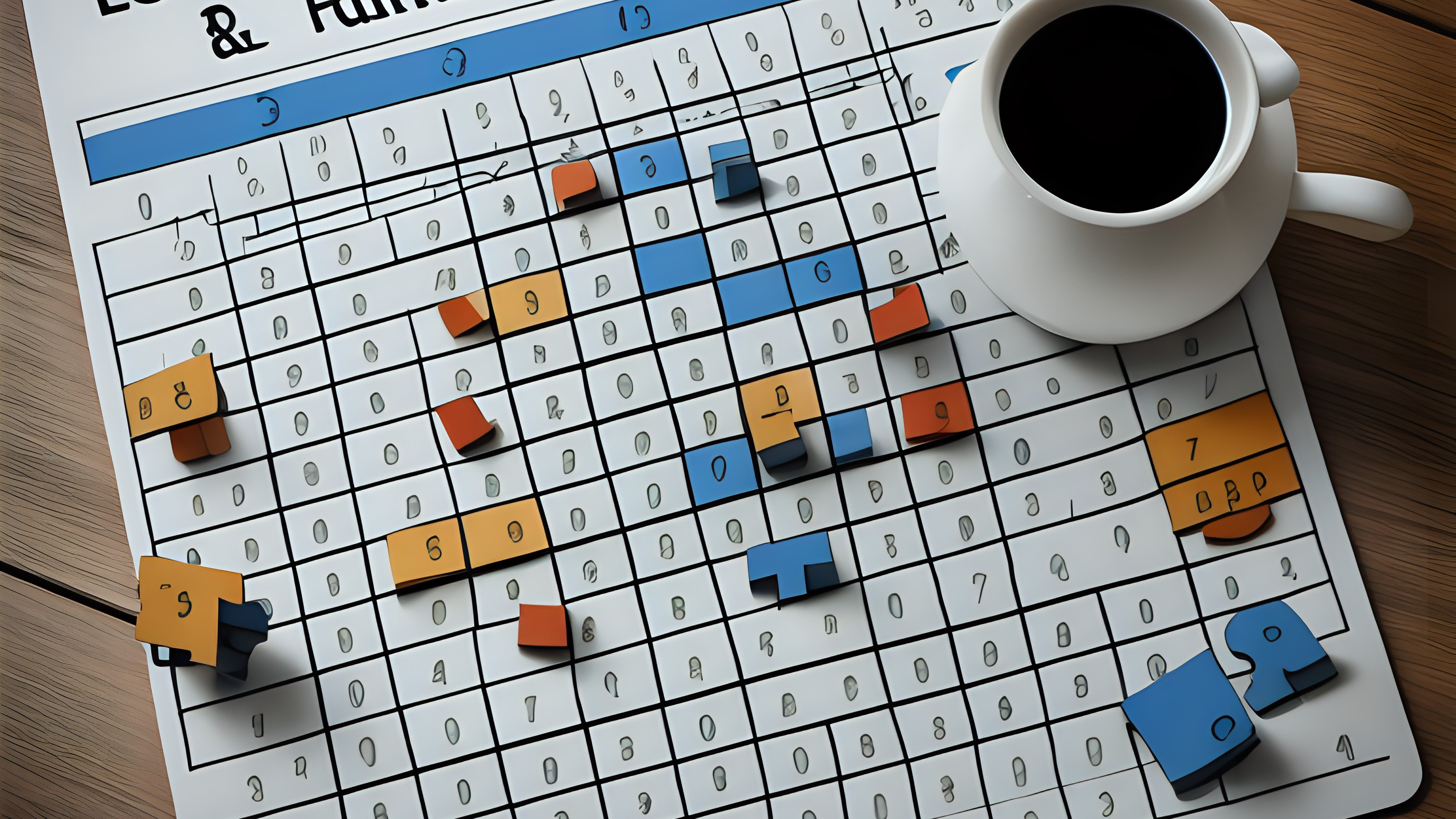
Boost your problem-solving skills and delve into endless fun with a logic puzzle game; an engaging way to master logical thinking.
Delving into the realm of puzzle games, you'll uncover a fascinating correlation with problem-solving skills. Embarking on this captivating journey allows us to shape our minds, honing our capabilities to analyze, strategize, and ultimately solve complex issues.
Playing puzzle games stimulates cognitive abilities, enhancing logical thinking and promoting intellectual agility, fostering strong problem-solving skills.
Puzzle games serve as a brilliant conduit for enhancing logical thinking. They cultivate our intellectual agility and foster a robust foundation for real-world problem-solving by guiding us to construct rational connections, recognize patterns, and make informed decisions.
Logic puzzles are an excellent tool for cognitive evolution, providing a fun and engaging platform for enhancing your intellectual abilities. They offer unexpected benefits that extend far beyond immediate entertainment value.
The engagement in puzzle playing demands heightened cognitive functioning, bringing several beneficial aspects. Scientists have found that puzzles stimulate the brain's neuroplasticity, allowing it to rewire and adapt over time.
Puzzle games are constructed with complex structures that compel the mind into analytical modes of thought. Solving puzzles often involves recognizing patterns, organizing pieces, or strategically thinking about future moves.
By decoding the mechanisms of puzzles, you can gain a deeper understanding of cognitive processes. It fosters decision-making skills, logical thinking, and creative problem-solving capabilities, leading to improved cognitive function.
Navigating the gaming landscape to pick the right puzzle game requires research into the genre's wide variety. Look for factors like unique mechanics, aesthetics, or storylines that may enhance your gaming experience.
Personal problem-solving style is vital when choosing a puzzle game. Some games lean heavily on mathematical logic, while others might employ spatial reasoning or pattern recognition. Choosing a puzzle game that aligns with your strengths can provide a more fulfilling gaming experience.
When diving into the world of logic puzzles, variety is key. Each variety offers unique mechanisms and challenges that align differently with individual learning styles.
Selecting a puzzle game with an appropriate difficulty level is essential for enhanced problem-solving skills. Knowledge of the game's challenge level, understanding cognitive intensity, and interpreting the system of difficulty tiers can provide an optimal puzzle-solving experience.
Unique features in puzzle games entice players to delve deeper. Anomalies, special rewards, hidden characters, or distinct gameplay serve as a treat for the problem-solver, enriching their gaming experience.
Novel attributes embedded within games engage gamers by stirring their curiosity. Whether it's the intrigue of an unknown level or the excitement of an unprecedented power-up, these features add an element of surprise, heightening player engagement.
The most captivating element in puzzle games can be their unique features. Delving into the unknown, experimenting with unheard-of power-ups, and unveiling secrets all make for an immersive, challenging experience that intrigues avid puzzle solvers and keeps them hooked.
The mechanics of puzzle-solving fundamentally involve a systematic and strategic approach, wherein breaking the puzzle into smaller, more manageable portions can provide a clearer route to the solution. It's akin to tackling a big project in stages – segregating the vast problem into easier sub-problems - eventually paving a smoother path to logic puzzle mastery.
Strategic play in puzzles requires consistent use of logic and deductive reasoning. Learning from mistakes forms an integral part of this process. Each failed attempt uncovers a new layer of understanding, subsequently helping to enhance strategy formulation. Indeed, the more you stumble, the more adept you become – transforming every stumbling block into stepping stones towards ultimate puzzle mastery.
In the realm of puzzles, partitioning presents an elegant solution to taming the logic beast. This art of splitting puzzles into smaller, more manageable sections enhances problem-solving abilities by making expansive, complex puzzles less intimidating.
Venturing into the domain of micro-solving could reveal wonders. This technique involves disassembling puzzles into digestible fragments, focusing on each piece before attempting to solve the whole. This progressional method mirrors the systematic nature of logic itself, facilitating a thoughtful and comprehensive solution.
Unleashing the power of logical deduction can turn a complex puzzle into a simpler task. By scrutinizing the game's design and its inherent patterns, gamers can predict future steps, honing their sequential thinking skills.
Unlocking a puzzle game hinges on the effective application of reasoning. Analyzing relationships within the game and drawing logical conclusions can expediently lead to the solution, fostering a sense of achievement.
Consistently practicing these strategies sharpens the mind, making it adept at pattern recognition. Over time, players will notice an enhanced ability to make faster, more accurate deductions, making the puzzling experience more enjoyable and less frustrating.
Mistakes act as building blocks in puzzle games - an essential part of the learning process. They help enhance strategic thinking by stimulating the brain to approach problems differently each time an error is made.
The educational power of failure in logic puzzles should not be underestimated. Each blunder paves the way for identifying patterns and improving reasoning, effectively constructing a competent problem-solver.
Embrace errors without trepidation but as crucial stepping stones. They serve to instil an appreciation for continuous learning, thus leading to a mature understanding and approach towards complex predicaments in logic puzzles.
The delightful joy of discovery that arises from cracking intricate puzzles provides a form of entertainment unique to these games. Each solved puzzle is akin to unraveling a mystery, heightening the satisfaction gained.
Exploring the fun factor of logic-based puzzles lies not solely in the solution but the journey towards it. The thrill of a challenge, the anticipation while unraveling complexity, and the sense of achievement upon reaching the solution are all parts of what makes these games an adventuresome and engaging pastime.
Unlock serenity with puzzle games, as they offer a unique route to relaxation. The methodical nature of puzzle games induces a joyful tranquility, akin to meditation, allowing you to focus on the present moment, shedding worries and stress.
Puzzle games serve as a brain escape, evoking calmness amidst the chaos of life. The intricate challenges found in these games demand your full attention, captivating the mind in such a way that the usual stressors and anxieties fade to the background, replaced by rewarding tasks and constructive thought patterns.
Puzzle games, in their very essence, are designed to challenge one's mental fitness. By demanding strict attention to detail, they provide an excellent training ground for focusing and honing your ability to concentrate effectively.
They are not mere games but concentration playgrounds. As you maneuver through complex mazes, crack codes, or rearrange scrambled images, you're exercising your mental muscle, mastering the art of undivided attention in a fun and engaging manner.
Puzzle games not only challenge your brain but also foster relationships. Every solved logic puzzle represents an achievement, a cause for celebration. These shared victories and hard-earned bragging rights bind players together, cultivating a vibrant community and a healthy competitive spirit.
Additionally, many puzzle games have integrated leaderboards and tournaments. These features induce the spirit of competition. This friendly rivalry among community members can help motivate players to hone their problem-solving skills, fostering continuous improvement enjoyably.

